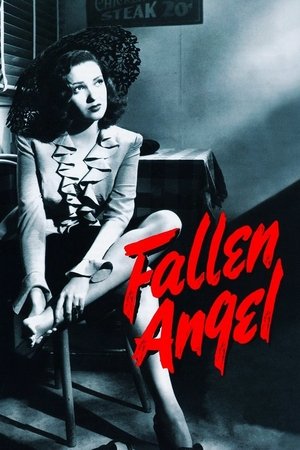
Fallen Angel
Then love alone can make the fallen angel rise. Fallen Angel is directed by Otto Preminger, with cinematography by Joseph LaShelle, who also worked with Preminger on the film Laura the year before. The film stars Alice Faye, Dana Andrews, Linda Darnell & Charles Bickford. Seen as something of a lesser entry in film noir and on Preminger's CV (he claimed to not even remembering the film when quizzed about it once!), the piece is famous for being the last film Faye made as a major Hollywood actress. Disappointed at how studio boss Darryl F. Zanuck and Preminger cut her role out of the picture (they were all about Darnell), Faye left the studio the day after a preview screening, and did not make another film for 16 years. The plot sees Andrews as press agent Eric Stanton, who down on his luck gets turfed off the bus some 150 miles from San Francisco and finds that he is in the small coastal town of Walton. Here he meets sultry waitress Stella (Darnell) and frumpy recluse June (Faye). The former he is very attracted too, so is everybody else it seems, the latter has just come into a lot of inheritance money, something else that catches Eric's eye. Pretty soon his life will be surrounded by love, infatuation, jealousy and worst of all - murder. More a mystery whodunit than an overtly dark venture into the realm of film noir, Fallen Angel is still a tidy and atmospheric movie. One where we can never be fully sure everything is as it at first seems. Especially the three main protagonists, where Preminger, in spite of not remembering doing so, misdirects the audience about the character's make ups. This greatly aids the whodunit structure where the killer is well disguised until the end reveal. Its also nicely shot by LaShelle, where the lighting is key for scenes involving the more vixen like Darnell and the more homely Faye, the difference, and what it says, is quite striking. It be a nice narrative line to follow on revisits to the film. The acting is safe, with Darnell leaving the red blooded men amongst us happy and wanting more. And in spite of some uneven threading of the plot in the last quarter, the end is a triumph and a genuine surprise. 7/10 Footnote: The source novel the movie was adapted from was written by Marty Holland. Also the author of "The File on Thelma Jordan" (1949), Marty was actually a she named Mary, of who little or nothing else is known about because after 1949 she upped and vanished never to be heard of again!
